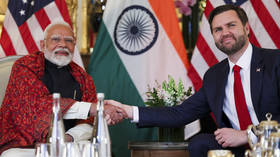Brazil unblocks Telegram

A Brazilian judge on Saturday suspended an injunction that saw the Telegram messaging app blocked across the entire country. The service was blocked after the Brazilian authorities requested user data on alleged neo-Nazi criminals, which the company says is impossible to provide.
In a ruling published on Saturday, a federal judge in the state of Espirito Santo declared that “it is not reasonable” to restrict the “freedom of communication of thousands of people” who have nothing to do with the criminal case being investigated, G1 news reported.
Google, Apple, and four Brazilian telecom companies were ordered by a Brazilian court last week to remove Telegram from their app stores and block access to the platform, after the company failed to turn over data on the administrators of a neo-Nazi group chat to investigators.
Police demanded access to the data after determining that a 16-year-old who shot four people dead and wounded nearly a dozen more at two schools in Aracruz in November had been spreading anti-Semitic content on Telegram groups, and had shared bomb-making tutorials and videos depicting violent deaths.
Telegram’s Russian-born CEO, Pavel Durov, vowed to appeal the ban, stating that the data requested by law enforcement was “impossible for us to obtain.” Telegram delivered some of the data, but did not supply the contact numbers of the administrators.
The court imposed a fine of 1 million reals ($198,000) per day as long as Telegram continued to withhold the rest of the data. The judge in Espirito Santo ruled on Saturday that this fine would remain in place.
The Brazilian government previously acted to suspend Telegram last year, alleging that the platform refused to comply with requests to stop the spread of “disinformation.” The company was then fined in January for refusing to suspend the account of right-wing lawmaker Nikolas Ferreira.
In a statement on Thursday, Durov said that in cases where local laws clash with his platform’s commitment to privacy, Telegram sometimes chooses “to leave such markets.”
“No matter the cost, we will stand up for our users in Brazil and their right to private communication,” he wrote.













